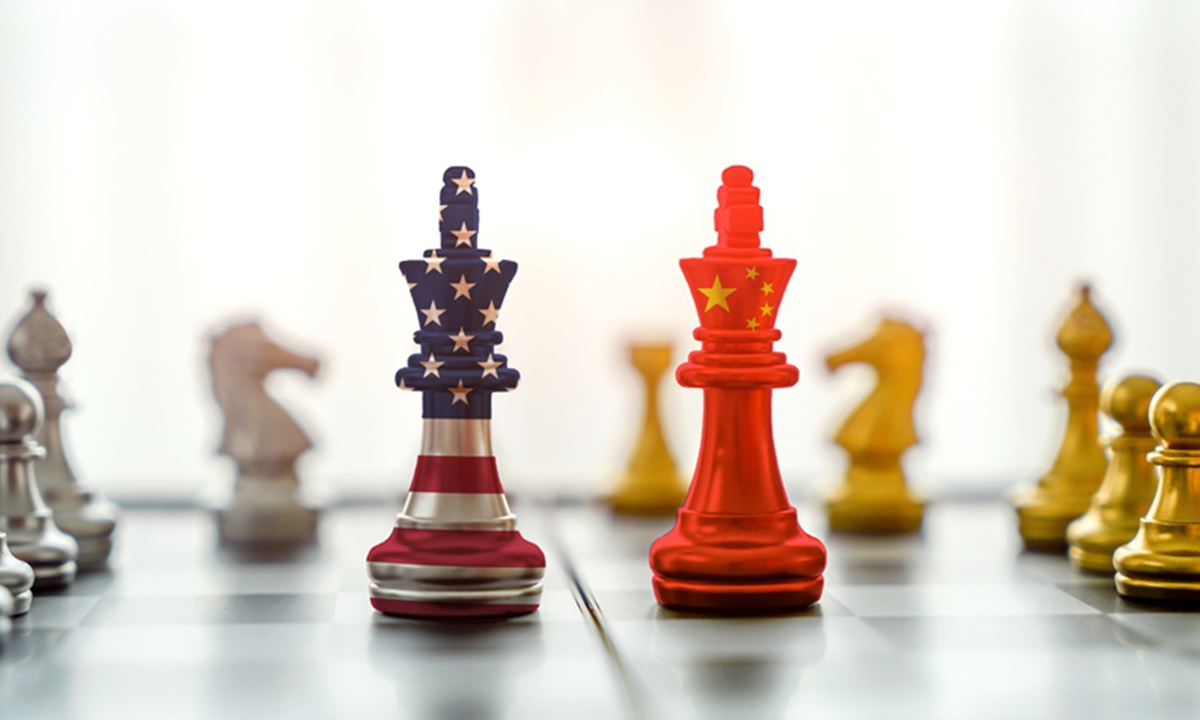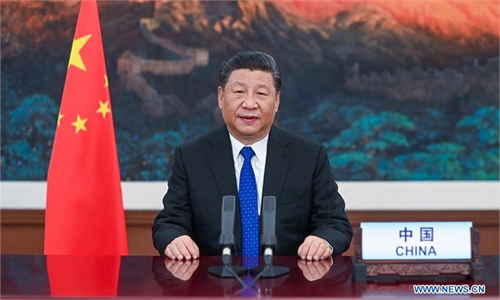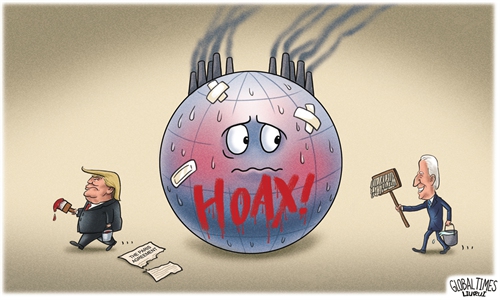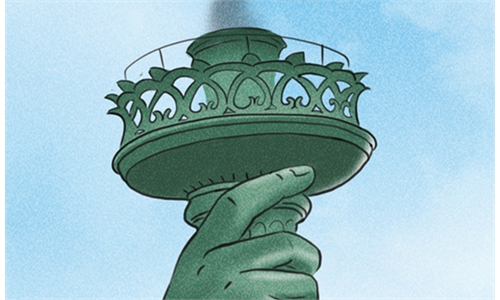Hostile US legislative acts against China ahead of climate summit show ‘hegemonic mentality,’ may interrupt potential cooperation

China-US Photo: GT
Twenty hours ahead of the first meeting between top Chinese and US leaders on climate change, an issue that will most likely see cooperation between China and the US, politicians in Washington stepped up their bipartisan efforts to counter China by pushing three bills calling for strategic competition with China and sanctions over Northwest China's Xinjiang Uygur Autonomous Region.
China expressed its explicit and strong opposition to the latest US acts. Chinese observers warned that the US should not dream of containing China economically, militarily and politically to maintain its dominant position. Creating confrontation will backfire against the US and it should cast aside its hegemonic dream and Cold War mentality. Such a self-contradicting practice that mixes hostility with a cooperative attitude could impact potential China-US cooperation.
The US Strategic Competition Act of 2021 was backed by the Senate Foreign Relations Committee in a Wednesday meeting, with the committee adding dozens of amendments including a boycott of the 2022 Beijing Winter Olympics by officials not athletes, Reuters reported Thursday.
The 280-page draft bill touched upon topics including investment to allies and international partners, foreign military funding of up to $655 million in the Indo-Pacific through 2022-26, as well as budgets to safeguard values with reference to China's Hong Kong and Xinjiang, according to the US Congress website.
On the same day, the House's foreign affairs panel unanimously passed the draft of the H.R.1155 Uyghur Forced Labor Prevention Act and a condemnation resolution over Xinjiang. The "forced labor" act, in addition to sanctions on officials and diplomatic methods, included a "rebuttable presumption," that is, all products produced in Xinjiang are to be seen as "forced labor" products unless sufficient evidence proves the opposite.
Those bills came at a time when China and the US are figuring out ways to cooperate regarding climate change, signaling that a confrontational facet in the US' China policy is fermenting and the spread of the political virus continues, observers said.
Climate change is not an issue that could help realize sustainable China-US cooperation because Republicans will abandon or overturn Biden's policy on the issue if it wins the election again in the future," Li Haidong, a professor at the Institute of International Relations at the China Foreign Affairs University, told the Global Times on Thursday.
Yuan Zheng, deputy director of the Institute of American Studies at the Chinese Academy of Social Sciences, told the Global Times on Thursday that seeking cooperation and confrontation simultaneously shows the US' logic that "harsh crackdowns force China to concede and cooperate."
"China will tell the US its logic is wrong and we will focus on our own pace regarding cooperation," Yuan said.
Chinese President Xi Jinping's attendance at the US-led climate summit could be a response to such hegemonic logic, "showing goodwill but not embracing the US' agenda."
Lü Xiang, an expert on US studies at the Chinese Academy of Social Sciences, said on Thursday that China will stay calm and focus on the big picture, seeking possible cooperation but not fearing competition.
The Biden administration knows competition is not the sole theme in relations with China and the two countries need to cooperate in lots of areas, especially regarding global issues. But the US' messages have been very chaotic, and sometimes self-contradictory on "cooperation with China." Lü told the Global Times.
The US' strategic competition act, which was voted 21-1 at the foreign relations committee of the Senate, needs to pass both the Senate and the House, and be signed into law. The other two Xinjiang-related bills require a similar process. It may take several months but will be "unlikely to be checked" as countering China is one of a few bipartisan consensuses in the divided US Congress, analysts said.
Wu Xinbo, dean of the Institute of International Studies at Fudan University in Shanghai, told the Global Times on Thursday that Republicans wanted to continue on the anti-China path set by Trump while the Democrats, who attach great importance to values and ideology, want to use human rights to gain the initiative in China-US interactions.
In a highly polarized and intense domestic political environment in the US, anti-China bills have become tools for US politicians of both parties to gain political capital, Wu said.
Competition model
China's National People's Congress (NPC) Foreign Affairs Committee on Thursday voiced strong opposition to the US' strategic competition act, which is brimming with a Cold War mentality and ideological bias, distorting and slandering China's development, internally and externally. The bill deliberately created an ideological confrontation and engaged in a zero-sum game. It is harmful for world peace, stability and development, and leads to nowhere, said You Wenze, spokesperson of the NPC committee.
China and the US, if engaging in competition, should compete in a fair and orderly manner. China proposes nonconfrontational relations of mutual respect with the US, while firmly safeguarding its national sovereignty, security and development interests, the spokesperson said.
China does not avoid talking about competition with the US, but it should be virtuous, not a "life-or-death struggle." Unfortunately, "the Trump administration started the destructive competition and the Biden administration is continuing it," Lü said.
Observers pointed out that a Cold War mentality is so deeply rooted in the US politics that they can only think of "a competitor as an enemy." Being No.1 in the world in many areas for decades has also embedded "America First" into not only the political establishment, but also the entirety of society.
Lü said the US cannot accept the possibility of falling into second place and has spared no effort in making this competition favorable to the US, including unfounded "forced labor" smearing on Xinjiang and attacks on Hong Kong.
The US recently expanded its crackdown on Xinjiang to the PV industry after cotton and textiles, and similar tricks unfolded. The US cultivated "NGOs" and "industry associations" to speak for it and act in line with US interests, which can coordinate political sanctions and trade restrictions.
Playing dirty exposed exactly the US' lack of confidence because it thinks it cannot win in a fair competition, Lü said.
The strategic competition act proposed to allocate funding to support military operations in the Indo-Pacific and other international assistance.
Observers predicted the two US parties would argue bitterly when it comes to a budget and even if the money is in place, its amount will be difficult to match the US' global ambition.



